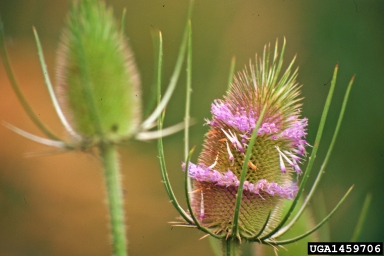 Purdue University - Extension - Forestry and Natural Resources
Purdue University - Extension - Forestry and Natural Resources
Got Nature? Blog
There are several teasel species present in the state of Indiana (Dipsacus lacinatus, and D. fullonum or sylvestris). I call them both non-native, invasive species (see post titled “Native or Not”). They are all over the state and the Midwest for that matter. I regularly see this species while driving around, whether I am conducting research or simply casually traveling. Birds eat the seeds and spread the seeds in their droppings; seeds are also transported on mower decks.

Common Teasel (Dipsacus fullonum) Steve Dewey, Utah State University, Bugwood.org
Teasels are biennial plants (similar to garlic mustard), but the rosettes are quite large and can be very easy to find as they can grow large in size. It seems that the plant is common on roadsides and abandoned lands with bare ground created by some level of disturbance. It is very similar in regards to places and growth habits as the biennial thistle species such as musk and bull thistle. Also they can be quite similar in regards to a single species colony as Canada thistle or even poison hemlock. I personally think it is a neat looking plant having been planted around the U.S. I have seen it portrayed in several art pieces with a goldfinch present, and the flower stalk is commonly used for flower arrangements. Would I plant it or try to propagate it? No, I would not plant it as I have been in too many areas where it becomes a dominant force and chokes out other vegetation. On the other hand, it is quite easy to control as there are many selective herbicides that are quite effective.
For more information on Cutleaf Teasel:
Cutleaf Teasel
By Glenn Nice
Purdue Extension Weed Science
Botany and Plant Pathology, Purdue University
Common Teasel
By John Cardina, Cathy Herms, Tim Koch and Ted Webster
Ohio Perennial and Biennial Weed Guide, Ohio State University
For more information on herbicide selection:
Indiana Select-A-Herbicide for Non-Crops
Extension Weed Science
Botany and Plant Pathology
Purdue University
Matthew S. Kraushar, Habitat Specialist
Forestry and Natural Resources, Purdue University

Recent Posts
- Farmers Helping Hellbenders RCPP Program Accepting Applications
Posted: May 1, 2024 in Aquaculture/Fish, Forestry, How To, Wildlife, Woodlands - Extension Specialist Brian MacGowan Receives Hoosier Wildlife Award
Posted: in Forestry, Wildlife - MyDNR – First positive case of chronic wasting disease in Indiana
Posted: April 29, 2024 in Alert, Disease, How To, Safety, Wildlife - Publication – Introduction to White-tailed Deer Impacts on Indiana Woodlands
Posted: April 28, 2024 in Forestry, Land Use, Plants, Publication, Wildlife, Woodlands - Publication – Understanding White-tailed Deer and Their Impact on Indiana Woodlands
Posted: in Forestry, Land Use, Plants, Publication, Wildlife, Woodlands - Publication – Monitoring White-tailed Deer and Their Impact on Indiana Woodlands
Posted: in Forestry, Land Use, Plants, Publication, Wildlife, Woodlands - Publication – Managing White-tailed Deer Impacts on Indiana Woodlands
Posted: in Forestry, Land Use, Plants, Publication, Wildlife, Woodlands - Report Spotted Lanternfly – Purdue Landscape Report
Posted: April 10, 2024 in Alert, Forestry, Invasive Insects, Plants, Wildlife, Woodlands - Declining Pines of the White Variety – Purdue Landscape Report
Posted: in Alert, Disease, Forestry, Plants, Wildlife, Woodlands - Are you seeing nests of our state endangered swan? – Wild Bulletin
Posted: April 9, 2024 in Alert, Forestry, How To, Wildlife
Archives
Categories
- Alert
- Aquaculture/Fish
- Aquatic/Aquaculture Resources
- Ask the Expert
- Christmas Trees
- Community Development
- Disease
- Drought
- Forestry
- Forests and Street Trees
- Gardening
- Got Nature for Kids
- Great Lakes
- How To
- Invasive Animal Species
- Invasive Insects
- Invasive Plant Species
- Land Use
- Natural Resource Planning
- Nature of Teaching
- Plants
- Podcasts
- Ponds
- Publication
- Safety
- Timber Marketing
- Uncategorized
- Urban Forestry
- Webinar
- Wildlife
- Wood Products/Manufacturing
- Woodland Management Moment
- Woodlands